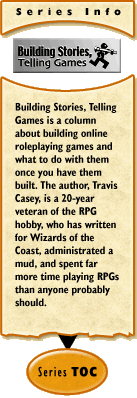
|
Genres - Fantasyby Travis S. Casey Fantasy is quite possibly the broadest of all genres. One could define it broadly as the genre of things that can't exist, couldn't have existed, and/or are considered highly unlikely ever to exist. Defining it in such a way, fantasy overlaps deeply into other genres, especially science fiction and horror. But while a broad definition of fantasy covers a huge area, the typical "fantasy game" fits into a narrow niche. The stereotypical "generic fantasy game" has several characteristics we can point out:
I could carry on with observations, but I think the general shape is coming clear. And this general shape, this definition of "generic fantasy", is what was laid down by Gary Gygax and Dave Arneson in D&D more than twenty-five years ago. Of course, they weren't originating it — the D&D setup was inspired by Tolkein's Middle Earth, Leiber's Nehwon, Howard's Hyboria, and so on. But Gygax and Arneson were creating a generic fantasy realm — indeed, their original title for D&D was The Fantasy Game. D&D inspired a great deal of fantasy in turn, especially in the mid-'80s through early '90s, and much of this fantasy used the same "generic fantasy" setup that D&D had created. Better authors put their own stamp on their worlds, of course, but a good deal of fantasy from that time period is obviously D&D with the serial numbers filed off. There's nothing innately wrong with that, but the great number of D&D-clone worlds obscures the richness of the fantasy genre. Why is fantasy so popular? Particularly, why is D&D-style fantasy so popular? Here's a few thoughts:
D&D itself is based in two different kinds of fantasy: epic fantasy, epitomized by Tolkein's Lord of the Rings; and the "swords & sorcery" fantasy of the pulps, such as Howard's Conan stories and Leiber's Fafhrd and the Grey Mouser stories. Epic fantasy centers around a quest, which is generally very important, and tends to involve a band of heroes working together instead of a single hero. S&S fantasy has more of a "job" orientation, with the protagonist (not necessarily a "hero"; S&S protagonists are often morally ambivalent) not on a quest, but just going about making a living — often a dishonest one. Instead of a band of heroes, S&S usually has either a single protagonist or a pair. Because of its setup generally requiring four or more characters to make an effective team, D&D lends itself to the epic mold. This, however, brings in a problem: the epic tone demands something larger-than-life. Doing a single epic quest is easy — but to have epic quests happening on a daily basis robs them of their epic feel. An epic is supposed to be something unusual, not something that happens on a regular basis. When everyone and everything seems to be larger-than-life, the epic quickly becomes mundane. That leads to a demand for more — something new and bigger to top what's been done before. But this quickly turns into a vicious cycle, with each new quest having to be more important, against more powerful villains, and with greater rewards. Within the context of a single paper RPG campaign, that may not be too bad — when things get to be too much, you can retire this set of characters and move on to something else. But in a multiplayer, continuing game, such an escalation has no real end in sight. S&S fantasy doesn't have so much of a "how do I top the last one" problem, but it can fall prey to a similar: a constant diet of "making a living in a fantasy world" can become boring. Better than a pure diet of either one is a mixture. And better still is to start bringing in other elements that both epic fantasy and S&S generally ignore or keep on the sidelines — things like politics and trade. As I said at the start of this column, fantasy is an incredibly broad genre — and so far, we've only really touched on "generic" fantasy. There's a lot to cover here, so we'll be continuing in a fantasy vein for at least the next column, and most likely the next two, talking about other forms of fantasy than epic and swords & sorcery, how fantasy overlaps with other genres, and some recommendations for fantasy books and stories. Come catch part 2 in two weeks!
|
